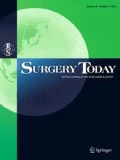Abstract
We report herein a case of papillary carcinoma which appeared to transform into anaplastic carcinoma during postoperative radioactive iodine-131 (131I) therapy. A 67-year-old man who was diagnosed as having papillary thyroid carcinoma with bilateral neck lymph node involvement and multiple lung metastases underwent total thyroidectomy prior to131I therapy. Immediately after a second course of131I therapy, the patient complained of right neck pain and swelling, and a biopsy of the swollen neck lymph node was taken. Histologic examination of this biopsy specimen revealed anaplastic carcinoma. With p53 immunohistochemical staining, both the primary tumor and the biopsy specimen were positive. We speculate that first, some DNA damage in tumor cells was induced by the initial131I therapy, but neither DNA repair nor cell apoptosis occurred because the p53 gene was already mutated; then further DNA damage was induced by the second131I therapy, leading to anaplastic transformation.
Similar content being viewed by others
References
Nishiyama RH, Dunn EL, Thompson NW (1972) Anaplastic spindle-cell and gaint-cell tumors of the thyroid gland. Cancer 30:113–127
Aldinger KA, Saaman NA, Ibanez M, Hill CS Jr (1978) Anaplastic carcinoma of the thyroid: a review of 84 cases of spindle and giant cell carcinoma of the thyroid. Cancer 41:2267–2275
Ito T, Seyama T, Mizuno T, Tsuyama N, Hayashi T, Hayashi Y, Dohi D, Nakamura N, Akiyama M (1992) Unique association of p53 mutations with undifferentiated but not with differentiated carcinomas of the thyroid gland. Cancer Res 52:1369–1372
Fagin JA, Matsuo K, Karmakar A, Chen DL, Tang S-H, Koeffler HP (1993) High prevalence of mutations of thep53 gene in poorly differentiated human thyroid carcinomas. J Clin Invest 91:179–184
Dobashi Y, Sakamoto A, Sugimura H, Mernyei M, Mori M, Oyama T, Machinami R (1993) Overexpression of p53 as a possible prognostic factor in human thyroid carcinoma. Am J Surg Pathol 17:375–381
Donghi R, Longoni A, Pilotti S, Michieli P, Della Porta G, Pierotti MA (1993) p53 mutations are restricted to poorly differentiated and undifferentiated carcinomas of the thyroid gland. J Clin Invest 91:1753–1760
Nakamura T, Yana I, Kobayashi T, Shin E, Karakawa K, Fujita S, Miya A, Mori T, Nishisho I, Takai S (1992)p53 gene mutations associated with anaplastic transformation of human thyroid carcinomas. Jpn J Cancer Res 83:1293–1298
Casson AG, McCuaig S, Craig I, Ayed A, Inculet R, Kerkvliet N (1994) Prognostic value and clinicopathologic correlation of p53 gene mutations and nuclear DNA content in human lung cancer: a prospective study. J Surg Oncol 56:13–20
Campo E, de la Calle-Martin O, Miquel R, Palacin A, Romero M, Fabregat V, Vives J, Cardesa A, Yague J (1991) Loss of heterozygosity of p53 gene and p53 protein expression in human colorectal carcinomas. Cancer Res 51:4436–4442
Marks JR, Humphrey PA, Wu K, Berry D, Bandarenko N, Kerns B-JM, Iglehart JD (1994) Overexpression of p53 and HER-2/neu proteins as prognostic markers in early stage breast cancer. Ann Surg 219:332–341
Evans HL (1986) Columnar-cell carcinoma of the thyroid. A report of two cases of an aggressive variant of thyroid carcinoma. Am J Clin Pathol 85:77–80
Sobrinho-Simoes M, Nesland JM, Johannessen JV (1988) Columnar-cell carcinoma. Another variant of poorly differentiated carcinoma of the thyroid. Am J Clin Pathol 89:264–267
Nishida T, Nakao K, Hamaji M, Nakahara M, Tsujimoto M (1996) Overexpression of p53 protein and DNA content are important biologic prognostic factors for thyroid cancer. Surgery 119:568–575
Bass IO, Mulder JR, Offerhaus GJA, Vogelstein B, Hamilton SR (1994) An evaluation of six antibodies for immunohistochemistry of mutant p53 gene product in archival colorectal neoplasms. J Pathol 172:5–12
Fan S, El-Deiry WS, Bae I, Freeman J, Jondle D, Bhatia K, Fornace AJ Jr, Magrath I, Kohn KW, O’Connor PM (1994)p53 gene mutations are associated with decreased sensitivity of human lymphoma cells to DNA damaging agents. Cancer Res 54:5824–5830
Lowe S, Ruley HE, Jacks T, Housman DE (1993) p53-dependent apoptosis modulates the cytotoxicity of anticancer agents. Cell 74:957–967
Lowe S, Schmitt E, Smith S, Osborne B, Jacks T (1993) p53 is required for radiation-induced apoptosis in mouse thymocytes. Nature 362:847–849
Clarke AR, Purdie CA, Harrison DJ, Morris RG, Bird CC, Hooper ML, Wyllie AH (1993) Thymocyte apoptosis induced by p53-dependent and independent pathways. Nature 362:849–852
Kuerbitz SJ, Plunkett BS, Walsh WV, Kastan MB (1992) Wildtype p53 is a cell cycle checkpoint determinant following radiation. Proc Natl Acad Sci USA 89:7491–7495
Author information
Authors and Affiliations
Rights and permissions
About this article
Cite this article
Shingu, K., Kobayashi, S., Yokoyama, S. et al. The likely transformation of papillary thyroid carcinoma into anaplastic carcinoma during postoperative radioactive iodine-131 therapy: Report of a case. Surg Today 30, 910–913 (2000). https://doi.org/10.1007/s005950070043
Received:
Accepted:
Issue Date:
DOI: https://doi.org/10.1007/s005950070043




